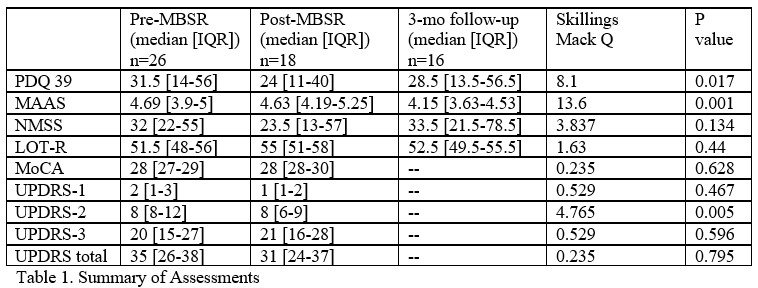Session Information
Date: Wednesday, September 25, 2019
Session Title: Non-Pharmacological Interventions
Session Time: 1:15pm-2:45pm
Location: Les Muses Terrace, Level 3
Objective: To assess the feasibility and impact of mindfulness based stress reduction (MBSR) on people with Parkinson’s disease (PD) and their carepartners.
Background: Non-motor symptoms of PD impair health-related quality of life (HRQOL), contribute to caregiver burden, and are poorly responsive to conventional medications. Mindfulness training has been shown to improve HRQOL in other chronic diseases [1]. We studied the impact of structured MBSR on HRQOL in people with PD and their carepartners.
Method: Participants with mild-moderate PD (Hoehn & Yahr stage ≤ 2.5) were recruited to undergo a 9-week MBSR course. Subjects completed the following questionnaires at screening, at the end of the course, and at 3-month follow-up: Parkinson’s Disease Quality of Life-39 (PDQ-39); Mindful Attention Awareness Scale (MAAS); Life Orientation Test-Revised (LOT-R); Non-Motor Symptoms Scale (NMSS). PD subjects were also assessed with the Unified Parkinson’s Disease Rating Scale (UPDRS) and Montreal Cognitive Assessment (MoCA). Carepartners will complete the Zarit Burden Inventory (ZBI) instead of the PDQ-39 and NMSS; other questionnaires will remain the same. The primary outcome measure was change in the PDQ-39 or ZBI; secondary outcomes included change in other questionnaires, objective measures, results of semi-structured interviews, and sustained change at 3 month follow-up. Because data were non-parametric and to account for loss to follow-up, Skillings Mack test was used.
Results: 26 PD participants (61% male) with a median age of 71 years (interquartile range [IQR] 66-73) and median disease duration of 6 years (IQR 4-10) were enrolled; 18 completed the full course and 16 completed the 3-month follow-up visit. Demographics of those lost to follow-up did not differ from completers. There were significant improvements in PDQ-39 after the MBSR course (median [IQR]pre = 31.5 [14-56] vs median [IQR]post = 24 [11-40]). At 3-month follow-up, median PDQ-39 slightly worsened (median [IQR]3mo = 28.5 [13.5-56.5]), but did not reach pre-MBSR levels. Responses to other measures are in Table 1 [table1]. Qualitative analysis is ongoing. The carepartner MBSR course will run from 26 March to 21 May 2019.
Conclusion: This study shows that MBSR improves HRQOL in people with PD. Limitations include a small sample size and relatively high dropout, suggesting challenges in adherence, which may limit feasibility of a MBSR program in the longer term.
References: 1. Greeson JM, Chin GR. Mindfulness and physical disease: a concise review. Curr Opin Psychol. 2018 Dec 27;28:204-210
To cite this abstract in AMA style:
D. Shah, S. Mantri, J. Cooney, A. Allen, K. Durham, J. Brantley, R. Vereen, P. Hickey, B. Scott. Mindfulness Based Stress Reduction in People with Parkinson’s Disease and their Carepartners [abstract]. Mov Disord. 2019; 34 (suppl 2). https://www.mdsabstracts.org/abstract/mindfulness-based-stress-reduction-in-people-with-parkinsons-disease-and-their-carepartners/. Accessed February 2, 2026.« Back to 2019 International Congress
MDS Abstracts - https://www.mdsabstracts.org/abstract/mindfulness-based-stress-reduction-in-people-with-parkinsons-disease-and-their-carepartners/

